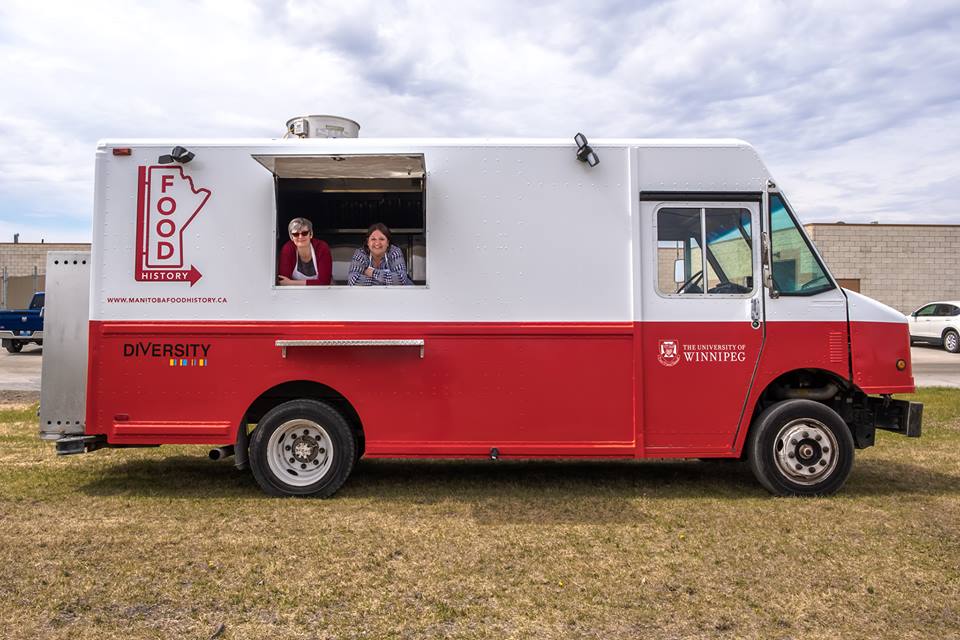Food
Palatable past: Travelling truck collects old prairie recipes

The Food History Project collects the back stories of manufacturing, production, retailing and, of course, eating in Manitoba. (Photo: Manitoba Food History Project/Facebook)
STEINBACH, Man. — There’s no wind and it feels like the sun’s heat has baked the inside of a food truck where Anna Sigrithur stands over a hot stove pouring crepe batter into a pan.
Without a second thought, Sigrithur flicks her wrist and the circular crepe flips over expertly.
“I didn’t expect that to happen,” she says with a laugh into a microphone that Sarah Story, a Manitoba archivist, is holding.
They aren’t the only ones in the food truck — which feels more like the inside of a radiating microwave than a kitchen on a recent hot Friday when it was parked near the Mennonite Heritage Village in Steinbach, Man.
Kent Davies, an adjunct professor at the University of Winnipeg’s Oral History Centre, chops garlic and asks Sigrithur questions about food, cooking and life.
The Food History Project collects the back stories of manufacturing, production, retailing and, of course, eating in Manitoba. The special red-and-white truck is travelling to different communities to gather people’s favourite food memories and to capture the province’s tasty traditions.
“The more we can understand the past in a fuller way, the better we can make choices for our future,” says Janis Thiessen, the project’s principal investigator and a history professor at the university.
“Food is an entry way into all those stories, all those histories.”
Researchers interview people while they cook about meaningful recipes in their life. The goal is to discover and record how they live, how their ancestors did and how communities have changed over time.
Inside the truck, as measuring cups, butter and milk are passed around, Sigrithur explains how she foraged the lambs quarters — a weedy green plant — at her partner’s farm in the heart of the Red River Valley near St. Adolphe. She talks about how food connects people to their past, the land and to each other.
“I’ve been spending a lot of time learning about wild plants, learning about ecology, and how we interact with the species around us, whether it’s animal or vegetable. I just really love sharing the things I’ve learned.”
Sigrithur is a chef and has a food podcast, but ordinary folk are invited to contact researchers to arrange a time to come to the truck, cook and share their connection to food. It doesn’t have to be great or even delicious, and people certainly don’t have to be crack culinary artists.
“We are not only interested in recipes that are your favourite or that are nostalgic and very rose coloured. It can also be something you hate with a passion,” says Kimberley Moore, an adjunct professor at the Oral History Centre.
Any audio from interviews will be archived at the centre and will be used to study Manitoba’s business, labour and cultural histories.
But the goal is also to make it accessible for anyone with a hunger for history. The audio will be made into podcasts, used in a digital map and shared in a storytelling cookbook.
“The fun and the challenge of the project is to do a history that is sophisticated and broad reaching, but also appeals to just an average audience — whoever is interested in learning about food in Manitoba,” Moore says.
The truck will be parked in Steinbach, Winnipeg and the Parkland region this summer and the project has funding to continue for at least four years. Researchers hope to fill the truck with the smells, tastes and sounds of prairie recipes and communities.
“Sometimes folks think their story is not worth telling, that they are not important enough. We want people to know you are exactly who we want to talk to,” Thiessen says.
“You don’t have to be a good cook. You don’t even have to like cooking, but do come and share your story with us.”





















